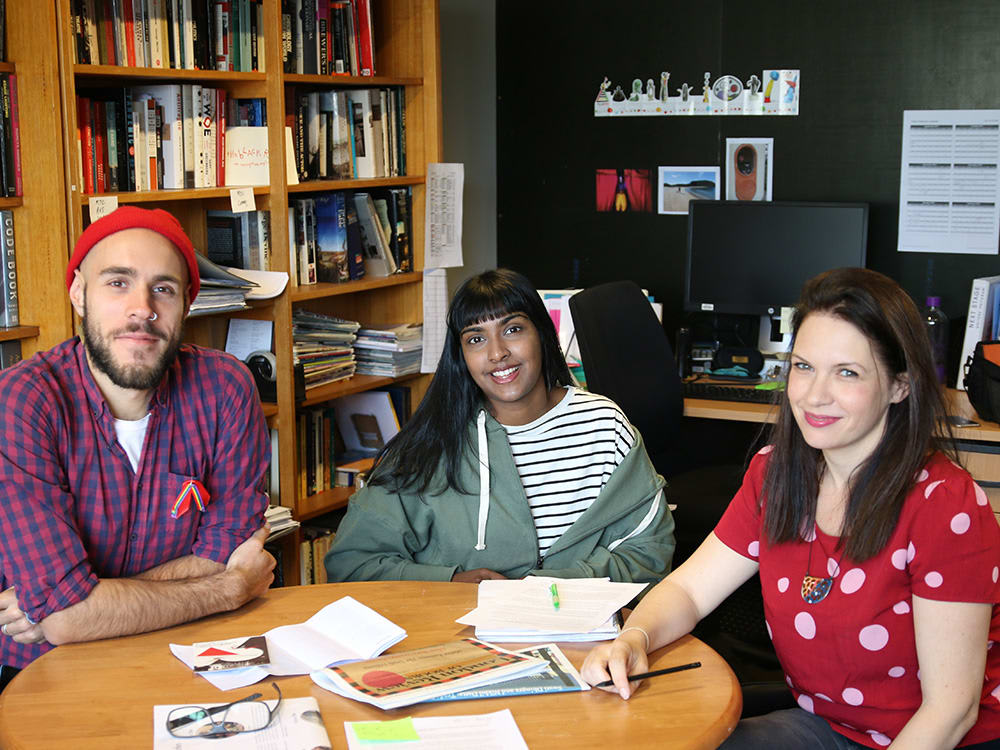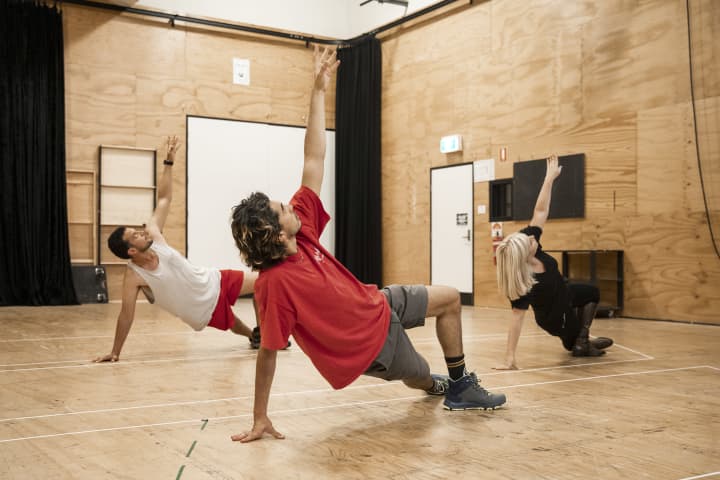A lawyer by day, Kylie Trounson is no slouch when it comes to her alternate identity of playwright: collecting several nominations and awards along the way, she has written numerous acclaimed works for Melbourne theatre companies big and small, including La Mama, St Martins Youth Theatre and MTC. She was also among the first cohort of playwrights accepted into the NEXT STAGE program as a writer-in-residence back in 2017. With the city’s stages still dark, she’s excited to be able to share with MTC audiences an excerpt of her latest work, Pandora.
One of the many works developed so far through the NEXT STAGE Writers’ Program, Pandora is an exciting new play with deep relevance to our times. By an accident of timing, it deals with some topics that have been thrown into a pretty strong spotlight in the past six months – clinical trials, for example – as it explores weighty issues such as eugenics and the science and ethics behind pursuing the perfect genome.
‘I thought he was mad when I started reading about the scientific detail of the technology, but when the ethical issues became apparent I realised there was a lot in there to explore.’
‘When I first pitched it, I thought of it as a tech-science thriller about CRISPR, the genome editing tool now revolutionising science,’ Trounson explains, as well as ‘a new global eugenics contest and the basic human desire for our children to be better than we are.’ As she worked however, her idea of the play evolved. First into ‘a cautionary tale about ambition, evolution and unintended consequences’ and finally a story of ‘a woman who has made exponential progress in the field of science, but has perplexing stasis in her own psychology – she is unable to love, unwilling to be vulnerable and has severed connection from everything that makes her human.’
Narratively, the scientist at the centre of Pandora ‘discovers a botched, secretive international experiment conducted by her employer and is the only one bold enough to ask: what do we lose when perfection becomes the norm? A series of revelations about her work incite her to wage a moral battle against corporations and governments, but it’s her connection to a young girl that unexpectedly transforms her life.’

Kylie Trounson during rehearsals for The Waiting Room. Photo: David Paterson
Zooming in
With COVID crimping all theatrical ambitions for 2020, it’s been a year of dramatic innovation and experimentation. So when MTC Associate Director Petra Kalive approached Trounson about working on an excerpt of Pandora, both women were excited by the possibilities. Read and recorded over Zoom by actors Don Hany and Naomi Rukavina under Kalive’s assured guidance, the result is a unique insight into a work’s development and a showcase of Pandora’s first act.
Their original plan was to workshop it with audio only. But after a rehearsal with the actors over Zoom, Trounson says ‘it became obvious that the words were written to be embodied, and curiously, it kind of worked – even though the actors were in different places and could only see a 2D representation of each other.’
‘It was an absolute delight to do a COVID ‘pivot’ and do some development work on this play with some very smart and talented people in a Zoom room.’
Committing to a Zoom presentation of the work, then agreeing to make the end result available for public viewing, the team dived in headfirst. It was at this point that Trounson ‘realised what a huge ask this was of the actors. They were having to read a new script on the screen while simultaneously trying to listen to and interact with a small-screen representation of the other actor, while also operating their own lighting, props and recording devices – all done in isolation in their own homes!’
For Hany and Rukavina to understand, embody and create character and to connect with each other in a very short amount of time was ‘a mammoth task’ but they rose to the challenge with ease and grace. ‘I think they did a brilliant job,’ says Trounson, while acknowledging that such a process will never be able to replicate the benefits of in-person work. ‘It was an interesting experiment, but it is absolutely no substitute for having people physically together to connect and create.’
Getting to work
Trounson began working on Pandora during the second year of her NEXT STAGE residency. As someone juggling many hats – actor (retired) and lawyer in addition to playwright and parent – she found the program invaluable for her writing self. ‘The two years that I was a writer-in-residence at MTC was a brilliant time where I was really able to dedicate myself to writing,’ she says. ‘I just loved it. I loved the act of going into the MTC offices to write. It was amazing to head off to work and arrive at an office and a desk, and actual co-workers – it made me much more productive than I am at home. As a writer you can feel very isolated and like you’re just plugging away silently and invisibly and never quite know whether what you’re writing has a kernel of gold or is an unmitigated disaster.’
The residency made her feel ‘part of the literary department, and the whole MTC family’. She had access to in-depth dramaturgical support – ‘being able to turn around from your computer and interrupt Dr Chris Mead [MTC’s Literary Director] with a burning question about structure was an utter privilege’ – and she developed great friendships and working relationships with the other residents, Dan Giovannoni and Natesha Somasundaram. ‘We would read each other’s work and try to help each other out when we hit walls and stumps. I’d never had a collegiate relationship with other playwrights like that before; it was golden!’

Kylie Trounson with fellow NEXT STAGE 2017 resident writers Dan Giovannoni and Natesha Somasundaram
Trounson finds inspiration for her writing in lots of things – ‘news articles, books, essays, conversations with people who do vastly different things in their lives than I do, or my little kids and their fascinating take on the world as they begin to grapple with it’ – but the ideas in Pandora were inspired by her father, pioneering in vitro fertilisation scientist Alan Trounson. ‘My dad gave me the idea to write a play about CRISPR. I thought he was mad when I started reading about the scientific detail of the technology, but when the ethical issues became apparent I realised there was a lot in there to explore.’
That she has also been able to explore a new way of bringing her work to an audience in a year when the world hangs on every scientific detail seems apt. ‘It was an absolute delight to do a COVID ‘pivot’ and do some development work on this play with some very smart and talented people in a Zoom room.’
NEXT STAGE is made possible with the support of our Playwrights Giving Circle Donors, The Ian Potter Foundation, Naomi Milgrom Foundation, The Myer Foundation, Malcolm Robertson Foundation and The University of Melbourne.
Published on 28 October 2020





